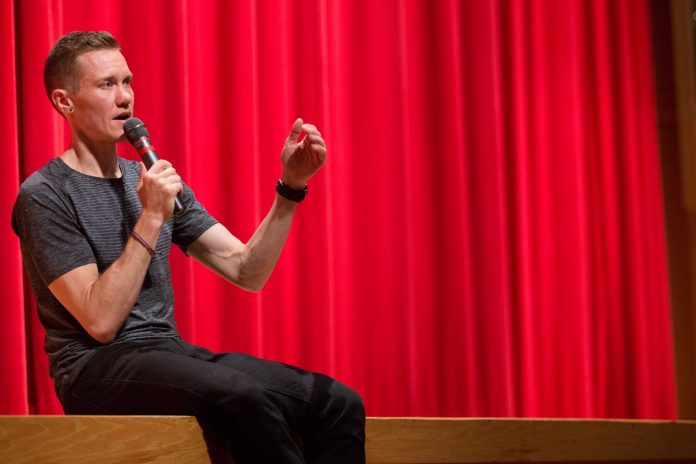

Triathlete and the first transgender man to ever make Team USA, Chris Mosier, gave a speech at DePauw University on Sunday entitled “Breaking Barriers: LGBTQ Inclusion in Athletics.”
As the Vice President of Program and Development and Community Relations for the organization You Can Play, Mosier’s job is to speak at college conferences and individual schools about LGBTQ inclusion in athletics.
Mosier discussed his experience not only as a transgender athlete, but also the role athletics played in his life before and during the transition process. Mosier said that since he was four years old, “athlete” is one of the words he would use to describe himself. Since his first Little League try-out, Mosier has felt a need to be the best.
Mosier explained how he found his self-worth in sports. When he started high school, people expected him to leave his tomboy tendencies behind and act more feminine. “I found my personal value and my identity in sports,” Mosier said, “because as weird as I was because I wore baggy pants and my hat backwards, people valued me because I had a really good jump shot.”
After high school, Mosier decided not to go into sports and focused on extracurriculars like his college newspaper and community service. Mosier said he told himself he did not go into sports because he wanted to concentrate on his academics, but he really just started to feel more uncomfortable in gendered situations. “It wasn’t that I didn't want to play sports, it’s just that I didn't want to play women’s sports, but at the time I couldn’t communicate that to anyone because I didn’t have the language,” Mosier said.
Now, Mosier wants to help students find and use the language he did not have at his disposal through conversations with collegiate athletes. He believes these conversations are necessary for change to occur.
Freshmen Amanda Grant believes Mosier’s speech will help start the conversations he discussed. “It was really interesting, it was really good to hear from a different perspective, because not a lot of people talk about it so it was good to create an environment where everyone can feel comfortable talking about it,” Grant said.
When Mosier graduated college, his current wife sent him a key asking him to move in together, which he did. After the move, he didn’t feel he had anything productive to do and became depressed. His partner gave him a time limit to go to a therapist, and finally he went. Soon he started exercising again and then running races of various lengths, eventually building up to 2008 when he ran the Chicago Marathon. Soon after, he bought a bike and began competing in triathlons.
In 2010, Mosier came out, started taking testosterone, and participated in his first race as a male. This Ironman race was the first time he got to run outside without his shirt and throughout the whole race he kept repeating to himself, “This is not hard, living my life as a transgender man is not hard.”
However, when he got to the finish line after 11 hours and 39 minutes, the presenter said “Congratulations you’re an Ironwoman,” to which Mosier replied, “F**k. To have been working out for 11 hours and 39 minutes at a race pace, and be received like that in the greatest achievement of my athletic career, I felt so invalidated,” Mosier said.
Mosier said his experience with sports the year before and the year after he transitioned was difficult because he felt he didn’t quite fit in any space. “I can run outside, I can bike outside, but I can’t swim anywhere but a pool,” said Mosier, “so what locker room am I going to use, and am I going to be safe in a men’s locker room?”
Navigating physical spaces was also difficult for Mosier. “When we’re not worried about hiding something and we can be ourselves, not have to drag all the baggage that’s with us from outside of our lives we can be better athletes, we are better athletes,” Mosier said.
Due to Mosier being the first transgender man in international triathlons, he said he had to be afraid and hide things. He hopes as more transgender people let other people know them as transgender, it will become easier.
The Athletics Department is hoping to make the process of coming out easier for transgender athletes at DePauw by bringing in speakers like Mosier. “We are looking to be proactive in saying to people and acting that this is an inclusive environment and that we want our students, our staff, our faculty, to feel that we are a welcoming environment for them,” said Stevie Baker-Watson, director of athletics,“If you can play then you can play, it’s as simple as that.”
